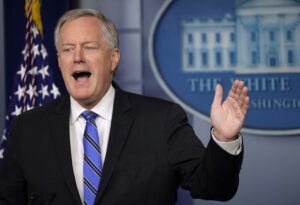[ad_1]

(Photo by Alex Wong/Getty Images)
Joint status reports are not known for being a locus of litigation hilarity, and yet this report and proposed scheduling order filed by former White House chief of staff Mark Meadows and the January 6 Select Committee contains some pretty funny stuff.
Meadows, who worked hand-in-glove with the Trump campaign and played a major role in promoting lies about a stolen election and organizing the pre-riot rally, sued the Committee in December to block subpoenas for his testimony and phone records. After turning over thousands of embarrassing texts, the erstwhile North Carolina congressman stomped off and refused to cooperate further, citing executive privilege.
So far the Justice Department has failed to act on a referral for contempt of congress, so the battle over Meadows’s testimony is being litigated in U.S. District Judge Carl Nichols’s courtroom.
Meadows, who is likely counting on the case disappearing after Republicans take back the House in November and nix all investigations of the Capitol Riot so they can spend more time getting to the bottom of Hunter Biden’s Laptop, the Greatest Political Scandal of All Time, proposes many, many rounds of dueling pre-trial motions. He also insists on his right to depose the Committee members on the topic of his own refusal to be deposed.
“Defendants note that Plaintiff Meadows has suggested that discovery might be appropriate on whether he acted in an official or unofficial capacity regarding President Trump’s various efforts to overturn the 2020 presidential election,” Committee counsel Doug Letter writes. “Defendants find this a perplexing position for two reasons.”
The Committee argues that no discovery is needed, since Meadows hardly has to ask them about his own conduct in the lead up to the Capitol Riot.
“Meadows himself is already acutely aware of whether he was or was not acting on behalf of the campaign in relevant circumstances,” they note dryly, before pointing out that, if Meadows seeks discovery as to whether he was acting in an official or unofficial capacity, then so will the Committee, at which point he’ll be sitting for the very deposition he filed this turkey of a lawsuit to avoid.
Second, if Plaintiff Meadows was actually attempting to use his office as Chief of Staff to influence a federal presidential election, that likely raises a range of other issues under federal and state law, with potential consequences for Mr. Meadows personally (or possibly Mr. Trump). In any event, if the Court, over the Select Committee’s objection, were to allow discovery on that topic, the Select Committee would immediately seek Mr. Meadows’s deposition on that specific issue.
And, oh, by the by, that stuff about members of congress “shall not be questioned in any other place” about their official duties is actually written in the Constitution’s Speech or Debate clause, unlike the judicially inferred executive privilege which Meadows is relying on.
Meanwhile, a coalition of 18 national media outlets, led by CNN, filed a motion to intervene in the case on First Amendment grounds for the limited purpose of gaining access to three sealed docket entries that appear to contain Meadows’s privilege logs.
“The Select Committee has told the American public that transparency will be key to its work. Indeed, the Select Committee’s press release announcing the filing of this summary judgment motion notes that it is ‘essential that the American people fully understand Mr. Meadows’s role in events before, on, and after January 6th,’” argued Charles Tobin of Ballard Spahr. “The Press Coalition advances precisely the same public interest in transparency and accountability by moving to intervene in this action and requesting that the Court unseal the Sealed Records.”
Which is far less funny than Meadows backing himself into testifying with his own aggressive discovery demands, but still important.
Meadows v. Pelosi [Docket via Court Listener]
Liz Dye lives in Baltimore where she writes about law and politics.
[ad_2]




